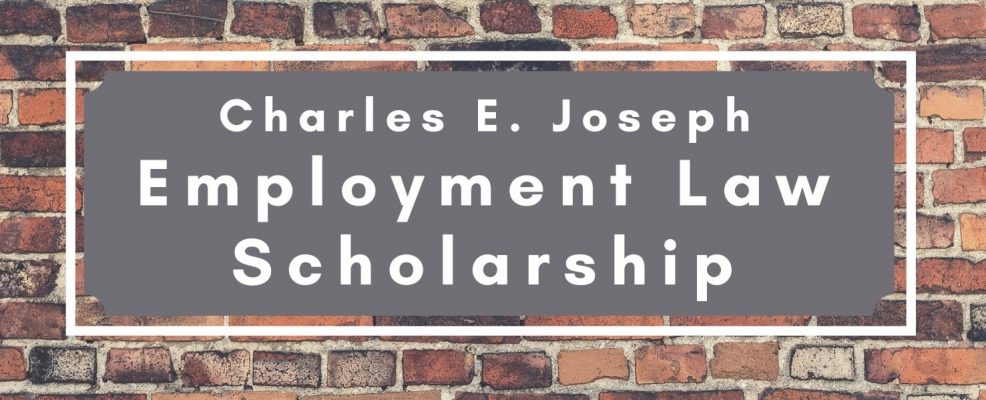
The American Legal System and the Collective Fight for Workers’ Rights
May 30, 2023
By Otto Barenberg
The Law Students on Workers’ Rights series publishes essays from current and incoming students at some of the top law schools in the country. These essays, submitted for the Charles E. Joseph Employment Law Scholarship, address the question “What are the biggest challenges facing workers’ rights in the future?”
“If democracy is justified in governing the state, then it must also be justified in governing economic enterprises; and to say that it is not justified in governing economic enterprises is to imply that it is not justified in governing the state,” writes the eminent political scientist Robert Dahl.
From the textile mills of Lowell to the classrooms of West Virginia—from the train car factories of Pullman to the barista bars of Starbucks—workers’ rights, however incomplete, are the hard-fought achievements of working people engaged in the collective project of deepening democracy.
The rights to organize, bargain collectively, and strike form the basis of workplace democracy and the wellspring from which other workers’ rights and protections—on discrimination, sexual harassment, wage theft, hours, and more—flow. In general, workplaces covered by collective bargaining agreements have higher wages, more robust health care coverage, better retirement plans, safer conditions, stronger protections against discrimination and sexual harassment, and higher barriers to at-will termination than their non-union counterparts.
But over the past 50 years, union membership has declined from 24% of the workforce to just 10%, and basic labor rights have come under increasing assault. In my conversations with local labor leaders across the Midwest, I’ve heard time and again statements like: “our organizing is zero,” “I watched our funds essentially dry up,” and “we’re definitely flailing.”
The erosion of workplace democracy is no accident. It’s not globalization, nor the secular decline of manufacturing, nor the rise of gig work, nor any other sort of ‘organic’ economic development that constitutes the proximate ablator of worker power, although these background factors are essential. Rather, workplace democracy has been the target of resource-intensive, sophisticated, and concerted attacks by networks of corporate interests and political entrepreneurs—efforts that, over time, have taken root in the U.S. legal system.
The key ideological turning point was the Powell Memorandum, a 1971 blueprint for corporate capture of U.S. democratic institutions. The Memorandum, and Justice Powell’s subsequent majority opinion in First National Bank of Boston v. Bellotti (1978), set the legal-ideological stage for SCOTUS’s landmark decision in Citizens United v. FEC (2010) and the torrent of corporate political spending that followed.
In recent years, employers have spent hundreds of millions of dollars annually on consultants and lawyers to forestall union elections, and hundreds of millions of dollars more on political candidates who promise their support for so-called “right-to-work” laws and other policies that subvert collective bargaining rights. They work in tandem with conservative political networks—such as ALEC and the constellation of Koch-backed organizations—eager to undermine the strength of an oppositional political constituency
Today, employers violate federal law in over 40% of union elections, engage in harassment, surveillance, and intimidation tactics in at least one-third of elections, and illegally fire workers in one-fifth of elections. In theory, the National Labor Relations Board (NLRB) would impose sanctions on employers who break the law sufficient to deter such violations. But sanctions are minimal. In the case of illegal terminations, for instance, the fired worker is awarded back pay, minus the wages that the worker earned after the firing (and, of course, the fired worker must work elsewhere to survive) or reasonably should have earned. The employer’s cost-benefit analysis—avoiding the lost profits from higher union wages versus the back-pay-minus-other earnings sanction—often comes out in favor of illegal firings.
Of course, the legal, political, and organizational challenges workers face are not new—far from it. American history is punctuated by social movements agitating for the codification of basic rights and the (vicious) backlash to their advancements.
Still, American workers’ employment protections are among the weakest among advanced economies. Only by ensuring democracy within the workplace and without—through legal reforms and social action—can we hope to secure the fundamental rights and protections to which all workers are entitled.
Reflections from Charles Joseph
Why do American workers have such weak employment protections? Wage theft costs workers billions; unfair firings happen every day; and nearly every employee has a story about a hostile work environment. Otto Barenberg’s winning essay points to the attacks on workers’ rights that leverage the legal system to erode vital protections.
Barenberg correctly points out that many employers have a perverse incentive not to stop illegal behavior in the workplace. Consider recent research on employment discrimination trials. In the Southern and Eastern Districts of New York, plaintiffs won approximately one-third of the time. The average settlement for pain and suffering was around $200,000. And only a small fraction of cases make it to trial. For large corporations, the cost of discrimination is shockingly low. Without making a change, workers will continue to pay the price.
Otto Barenberg holds a bachelor’s degree from Harvard University and a master’s in comparative social policy from Oxford University. He will join the Harvard Law School class of 2026 in the fall. Barenberg is also the winner of the Charles E. Joseph Employment Law Scholarship for the 2023/2024 academic year. Contact Barenberg on LinkedIn.
Charles Joseph has over two decades of experience as an NYC employment lawyer. He is the founder of Working Now and Then and the founding partner of Joseph and Kirschenbaum, a firm that has recovered over $140 million for clients.